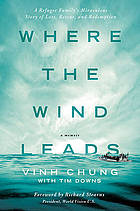
Where the Wind Leads
A Refugee Family's Miraculous Story of Loss, Rescue, and Redemption
کتاب های مرتبط
- اطلاعات
- نقد و بررسی
- دیدگاه کاربران
نقد و بررسی

March 10, 2014
Memories of Communist Vietnam are often limited to the American side of the tension, and particularly the harrowing experiences that soldiers faced during the war. Chung, a dermatologist, offers a tripartite portrait: his family’s everyday life under the Communist regime, agonizing escape as refugees, and assimilation and integration into American society. Readers are given a glimpse into the dynamics that define the Chinese-Vietnamese family and how these intricate relationships and their elements, such as elder authority, influence interactions more broadly, within the community and, ultimately, American society. After his family’s near-death encounters in Vietnam and the South China Sea, Chung is given a life his parents could not have. He offers a conversational, unpretentious narrative of the young immigrant/refugee experience, with its unconscious social faux pas; growing awareness of American class, race, and gender relations; and ambition to not only attain the American Dream but to take back what was taken away from his parents’ generation: opportunity. This may remind those with immigrant/refugee experiences of their own lives; for others, Chung provides a humble story about coping with uprootedness, adversity, and assimilation into new social landscapes.

March 15, 2014
With assistance from Downs (Wonders Never Cease, 2010, etc.), dermatologist Chung chronicles his family's flight from communist rule in Vietnam to their subsequent life in America. The author describes his experiences beginning in 1978, when he was 3 and arrived in Arkansas, one of eight children in a destitute refugee family that "went to sleep in one world and woke up in another." In Vietnam, his father managed his family's merchant empire in the Mekong Delta. As ethnic Chinese, they maintained traditional Asian values. His parents, whose marriage had been arranged, lived with their extended family in a compound, and his widowed grandmother controlled the money with an iron fist. Despite their great wealth, his mother was consigned to a life little better than that of a servant, while his father maintained a mistress. After the revolution, Chung's parents and their children were part of the legendary exodus of the boat people. The author provides a harrowing account of their desperate escape and rescue at sea. Left adrift on the ocean by Malaysians who refused them refuge, the nearly 100 people on board were at the point of death by dehydration. Miraculously, they survived against the odds and were picked up by a boat on the lookout for boat people needing assistance. With the help of The World Vision National Leadership Council, the family received asylum in America. Chung tells of his father's uncomplaining struggle to support his family by working on a factory assembly line while raising his children in a culture whose ways and language were foreign to him. Like many children of immigrants, the author faced racism and discrimination, yet he achieved academic success at Harvard, pursued a distinguished career and "became more American than many who were born here." A worthy addition to the immigrant bookshelf. Though targeted at the Christian market, the book should have wider appeal.
COPYRIGHT(2014) Kirkus Reviews, ALL RIGHTS RESERVED.

























دیدگاه کاربران